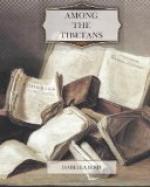Gergan’s home was typical of the dwellings of the richer cultivators and landholders. It was a large, rambling, three-storeyed house, the lower part of stone, the upper of huge sun-dried bricks. It was adorned with projecting windows and brown wooden balconies. Fuel— the dried exereta of animals—is too scarce to be used for any but cooking purposes, and on these balconies in the severe cold of winter the people sit to imbibe the warm sunshine. The rooms were large, ceiled with peeled poplar rods, and floored with split white pebbles set in clay. There was a temple on the roof, and in it, on a platform, were life-size images of Buddha, seated in eternal calm, with his downcast eyes and mild Hindu face, the thousand-armed Chan-ra-zigs (the great Mercy), Jam-pal-yangs (the Wisdom), and Chag-na-dorje (the Justice). In front on a table or altar were seven small lamps, burning apricot oil, and twenty small brass cups, containing minute offerings of rice and other things, changed daily. There were prayer-wheels, cymbals, horns and drums, and a prayer-cylinder six feet high, which it took the strength of two men to turn. On a shelf immediately below the idols were the brazen sceptre, bell, and thunderbolt, a brass lotus blossom, and the spouted brass flagon decorated with peacocks’ feathers, which is used at baptisms, and for pouring holy water upon the hands at festivals. In houses in which there is not a roof temple the best room is set apart for religious use and for these divinities, which are always surrounded with musical instruments and symbols of power, and receive worship and offerings daily, Tibetan Buddhism being a religion of the family and household. In his family temple Gergan offered gifts and thanks for the deliverances of the journey. He had been assisting Mr. Redslob for two years in the translation of the New Testament, and had wept over the love and sufferings of our Lord Jesus Christ. He had even desired that his son should receive baptism and be brought up as a Christian, but for himself he ’could not break with custom and his ancestral creed.’




